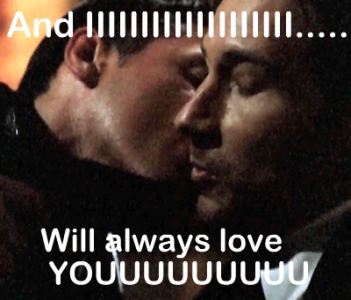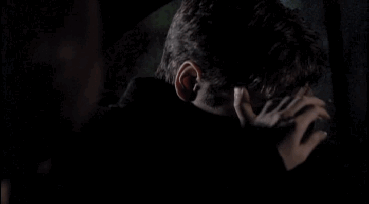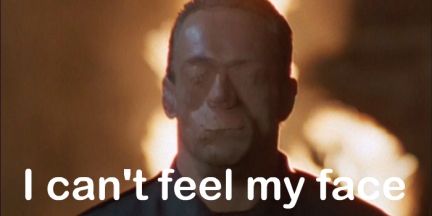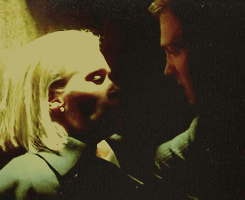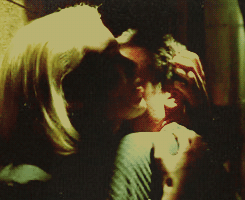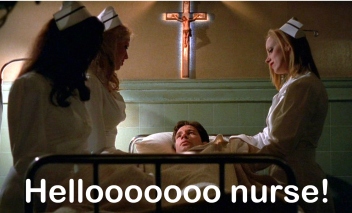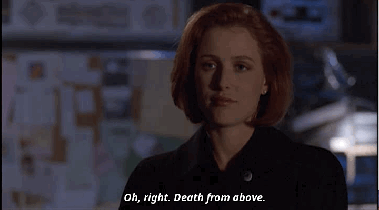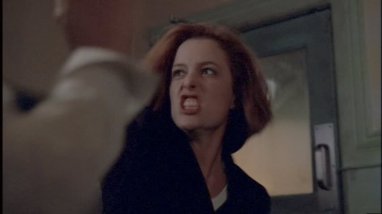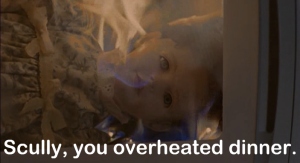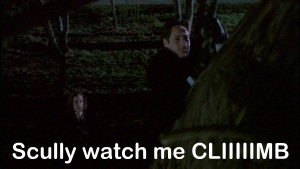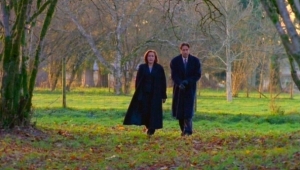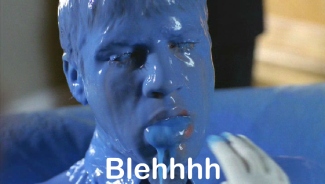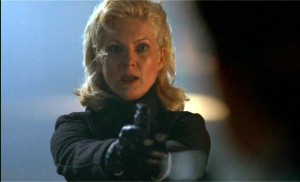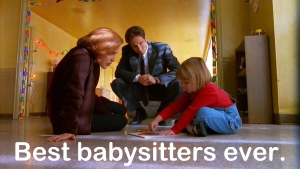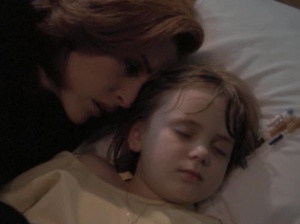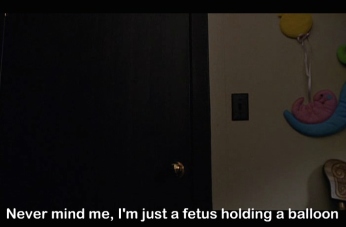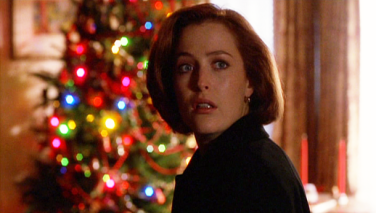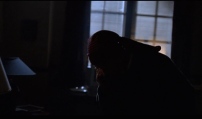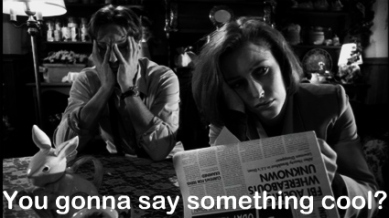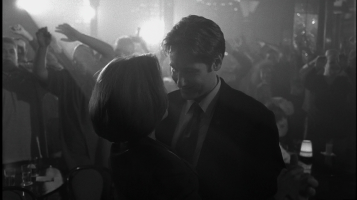SCULLY: (on phone) There’s evidence of a progressive degenerative bone disease and, uh, I know you’re going to think that I’m crazy … but I swear I found evidence of something winglike.
MULDER: (on phone) Well, then, maybe she flew here, Scully.
That’s tasteful, Mulder. Just downright classy of you. Making jokes about dead teenage girls. Because that’s totally something Mulder would do, given the loss of his one and only sister.
Season 5, Episode 17: “All Souls”

Hey. Have you ever wondered what would happen if Season 3’s “Revelations” and Season 5’s “Emily” gave birth to an episode?
No. Of course you haven’t. Nobody wants to see that. But they did it. And here we are.
This episode is just…gahhhh. I mean, haven’t we had enough of this shit? Can we please just sweep away the Emily storyline and be done with it? This is just another excuse to see Scully suffer for another forty-five minutes, and it’s completely pointless. I suppose you could argue that “Christmas Carol” and “Emily” weren’t totally pointless because of their (albeit flimsy) connection to the mythology, but this? This is a standalone. Emily’s dead. That storyline was awful. Please can we be done with this?
I don’t mean to churn out another negative review in a mostly fantastic season of The X-Files. But if I’m being honest, I hate this episode. Though it may not be as bad technically, in some ways this episode bothers me even more than the “Emily” duo because it reintroduces Intolerant Mulder Jerk, which has unfortunately become a bit of a trope (and a majorly shitty one at that). It also attempts to be another episode that explores Scully’s religion. But unlike “Revelations,” which actually explores the nature of Scully’s belief when faced with religious extremism, in “All Souls” Scully’s beliefs aren’t so much explored as they are chucked at her face in the most horrendous of ways. Do you find comfort in God, Scully? Here’s a religiously symbolic dead girl to remind you of your own dead daughter!
I understand that many religious people, especially Catholics, stay grounded to their religion even in the midst of some of the church’s somewhat harsh, traditionalist, and yes, extreme aspects, but when we’re given misery after misery in every single one of these religious episodes, it’s hard to see what solace, if any, Scully finds in her faith. I don’t think that Scully’s faith has even once shown any meaning to her apart from when her life gets really, really difficult. And yes, I know that’s part of the point; that when her science can’t give her the answers (which usually means she’s facing a crisis) Scully turns to her religion. I get it.
But in “All Souls” this relationship feels incredibly forced. By the end (which is such a shameless, pitiful attempt to redo the ending from “Revelations” it gives me a headache from excessive eye-rolling), Scully reaches the conclusion that – well, what? That faith is accepting loss? It may be true but it’s freaking depressing! Can’t Scully’s religion make her happy?
“But Meghan,” I hear the whiny little protest voices say, ” ‘Revelations’ wasn’t happy for Scully either. And wasn’t that a religious episode you actually liked?”
Sigh. I do like “Revelations” a lot, and I have to sheepishly admit that my review for that episode is one of my favorites. So the comparison is unavoidable, it seems. Let’s stack up these endings next to one another.
“All Souls”
PRIEST: You believed you were releasing her soul to Heaven.
SCULLY: I felt sure of it.
PRIEST: But you still can’t reconcile this belief with the physical fact of her death?
SCULLY: No. I thought I could, Father, but I can’t.
PRIEST: Do you believe there is a life after this one?
SCULLY: Yes.
PRIEST: Are you sure?
(SCULLY tries to answer, but cannot.)
PRIEST: Has it occurred to you that maybe this, too, is part of what you were meant to understand?
SCULLY: You mean, accepting my loss?
PRIEST: Can you accept it?
SCULLY: Maybe that’s what faith is.
“Revelations”
PRIEST: Maybe they weren’t meant for him to see. Maybe they were only meant for you.
SCULLY: Is that possible?
PRIEST: With the Lord, anything is possible. Perhaps you saw these things because you needed to.
SCULLY: To find my way back?
PRIEST: Sometimes we must come full circle to find the truth. (Scully looks up at the priest) Why does that surprise you?
SCULLY: Mostly, it just makes me afraid.
PRIEST: Afraid?
SCULLY: Afraid that God is speaking … but that no one’s listening.
Apart from being much better written, look at how Scully reacts to the priest in “Revelations.” She listens and comes to a conclusion about God and her faith based on what she’s seen and experienced in the episode. The “full circle to find the truth,” which is threaded throughout the episode, beautifully encompasses Scully’s struggle to understand her own faith. I can’t see any conclusion reached in “All Souls,” apart from that really, really sad things happen and faith is going to Confessional and attending Mass even though you don’t understand why God would let such a tragedy occur. “Revelations” is “God works in mysterious ways, but keep trying and maybe you’ll understand His intentions if you really listen.” “All Souls” is “God works in mysterious and fucked up ways, and faith provides no comfort for me, even though I will continue to be virtuous and faithful.” I can’t get behind that. Do I want or even need a solid, neatly wrapped conclusion? Of course not. “Revelations” didn’t have a cherry on top of its ending, either. But nothing in “All Souls” feels connected. Nothing makes me interested in these questions Scully’s found herself asking, fascinating though they may be. I just want the whole damn miserable thing to be over.
I’ve rambled too much already, so to sum up I’ll just snag a quote from Musings of an X-Phile’s review of this episode.
“I realize that Scully’s lovely when she’s somber but would it have been possible to have an episode centered around her faith that left her cheerful rather than crying in a confessional booth?”
I have nothing to add. Let’s be done with this.
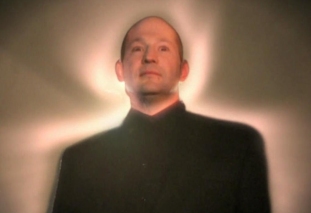
Final Score

Final score for “All Souls” is 4/10. With this score I’m trying to be as fair as I can possibly be. I don’t like it, but don’t think I haven’t considered the possibility that this episode just wasn’t made for me. I don’t understand its purpose in the show but I realize there are many that find it meaningful, and unlike some of the other “objectively” terrible episodes – “3,” for instance – I don’t think you’re a nutball if you like this one. But it gets a massive thumbs down from me.
Notable Nuggets (and Nitpicks)
- Mulder wears sunglasses, and I’m always down for that.
- Gillian Anderson is of course very good in this episode and looks particularly lovely.
- Mulder feels very out of place in this episode, which is weird for me to say. I almost wanted him to go away, and that’s criminal.
